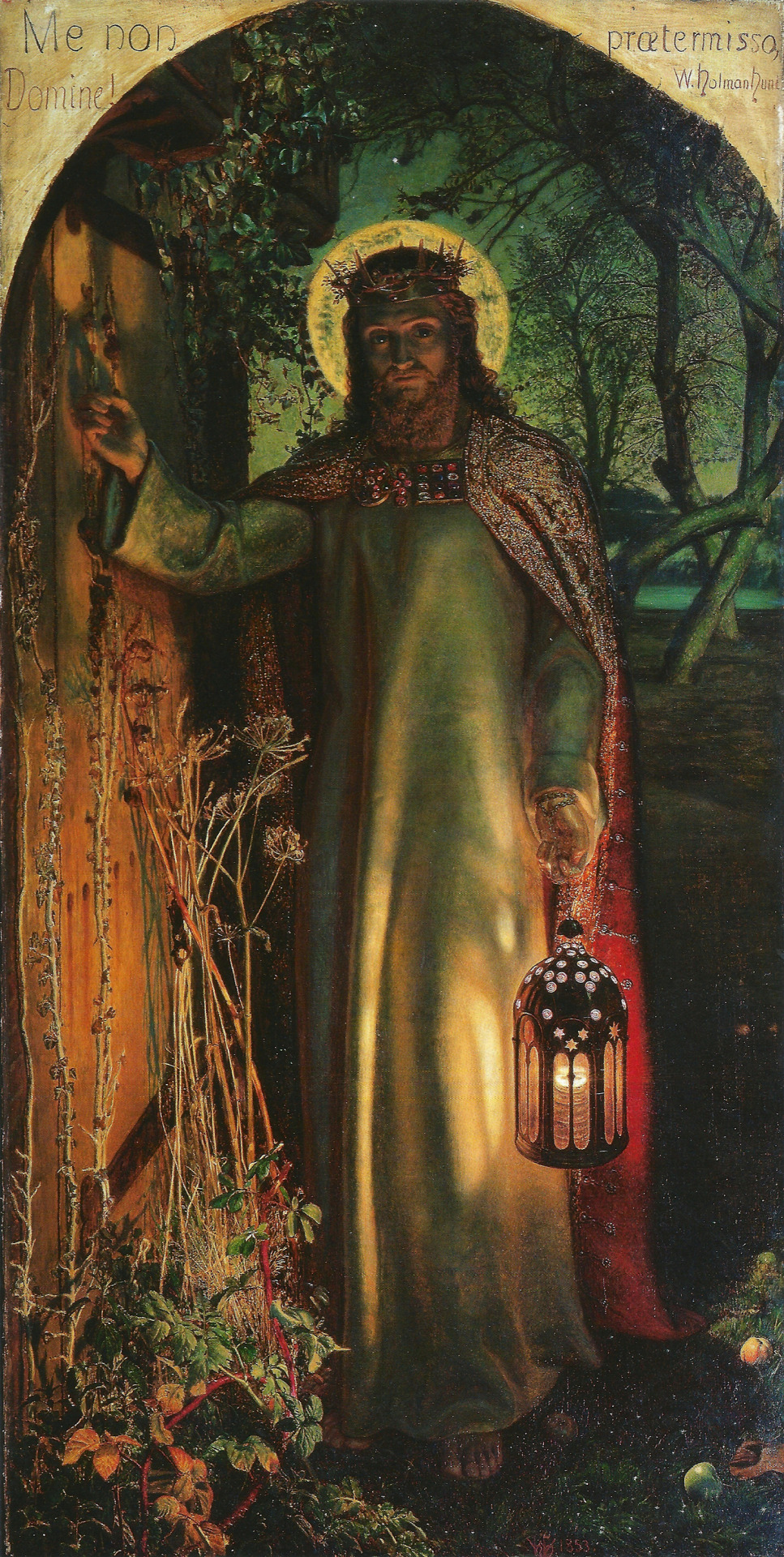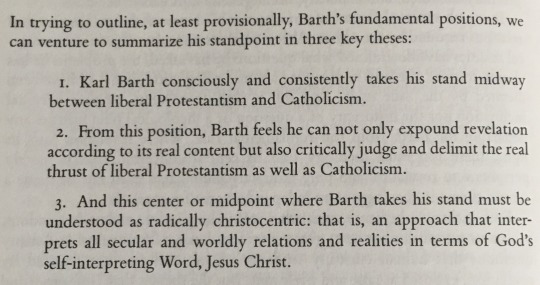#john henry newman
Text
"God beholds you. He calls you by your name. He sees you and understands you as He made you. He knows what is in you, all your peculiar feelings and thoughts, your dispositions and likings, your strengths and your weaknesses. He views you in your day of rejoicing and in your day of sorrow. He sympathizes in your hopes and your temptations. He interests Himself in all your anxieties and remembrances, all the risings and fallings of your spirit.
He encompasses you round and bears you in His arms. He notes your very countenance, whether smiling or in tears. He looks tenderly upon you. He hears your voice, the beating of your heart, and your very breathing. You do not love yourself better than He loves you. You cannot shrink from pain more than He dislikes your bearing it; and if He puts it on you, it is as you would put it on yourself, if you would be wise, for a greater good afterwards."
~John Henry Newman
65 notes
·
View notes
Text

William Holman Hunt, The Light of the World (1851–1854)
* * *
Lead Kindly Light
“Lead, Kindly Light, amidst th'encircling gloom,
Lead Thou me on!
The night is dark, and I am far from home,
Lead Thou me on!
Keep Thou my feet; I do not ask to see
The distant scene; one step enough for me.
I was not ever thus, nor prayed that Thou
Shouldst lead me on;
I loved to choose and see my path; but now
Lead Thou me on!
I loved the garish day, and, spite of fears,
Pride ruled my will. Remember not past years!
So long Thy power hath blest me, sure it still
Will lead me on.
O'er moor and fen, o'er crag and torrent, till
The night is gone,
And with the morn those angel faces smile,
Which I have loved long since, and lost awhile!”
— John Henry Newman
#William Holman Hunt#The Light of the World#Art#Beauty#Painting#Pre-Raphaelite#Lead Kindly Light#Poetry#Wisdom#John Henry Newman#Night
13 notes
·
View notes
Text
"Mary has been made more glorious in her person than in her office; her purity is a higher gift than her relationship to God. This is what is implied in Christ's answer to the woman in the crowd who cried out, when he was preaching, 'Blessed is the womb that bore thee, and the breasts which thou hast sucked.' He replied by pointing out to his disciples a higher blessedness; 'Yea, rather blessed,' he said, 'are they who hear the word of God and keep it...'
Protestants take these words in disparagement of our Lady's greatness, but they really tell the other way. For consider them; he lays down a principle that it is more blessed to keep his commandments than to be his Mother, but who even of Protestants will say that she did not keep his commandments? She kept them surely, and our Lord does but say that such obedience was in a higher line of privilege than her being his Mother. She was more blessed in her detachment from creatures, in her devotion to God, in her virginal purity, in her fullness of grace, than in her maternity. This is the constant teaching of the holy Fathers: 'More blessed was Mary,' says St Augustine, 'in receiving Christ's faith, than in conceiving Christ's flesh.' And St Chrysostom declares that she would not have been blessed, though she had borne him in the body, had she not heard the word of God and kept it.
This of course is an impossible case; for she was made holy that she might be his Mother, and the two blessednesses cannot be divided." - St John Henry Newman, The Mystical Rose, originally in Discourses to Mixed Congregations
28 notes
·
View notes
Text

« Growth is the only evidence of life.
– John Henry Newman »
said THE NEW POPE
#farida#aida#twin art#twin artists#ismailova twins#ismailovatwins#paolo sorrentino#paolo sorrentino film#italian film director#the new pope#italy#italian tv series#tv series#italian cinema#jude law#jude law fans#john malkovich#john malkovich fans#john henry newman#cristiano travaglioli#film editor#pope#man#character#character design#film poster#movie poster#poster#illustration#digital art
7 notes
·
View notes
Text

If this is an accurate characterization of Karl Barth’s standpoint, then there is an interesting comparison to be drawn between Barth’s Reformed theology and St. John Henry Newman’s attempt to describe the Church of England as a via media between Protestantism and the Church of Rome.
(Source: Hans Urs von Balthasar, The Theology of Karl Barth)
3 notes
·
View notes
Note
Can you do St John Henry Newman please. I think he's underated amoungst the Catholic Tumblrinas.
THIS IS THE FIRST NOMINATION FOR JOHN HENRY CARDINAL NEWMAN
I dreamt of my Newman Center last night, actually. Someone's going to have to send in more nominations for Newman because he really is so underrated!
You'll have to send in more propaganda for him though :)
#st john henry newman#john henry cardinal newman#john henry newman#catholic#catholicism#roman catholicism#roman catholic#christianity#catholic saint tournament#catholic saints#send in your propaganda
9 notes
·
View notes
Quote
Life passes, riches fly away, popularity is fickle, the senses decay, the world changes. One alone is true to us; One alone can be all things to us; One alone can supply our need.
John Henry Newman
43 notes
·
View notes
Text

THE DESCRIPTION OF SAINT JOHN HENRY NEWMAN
The Patron of the Personal Ordinariate of Our Lady of Walsingham in England and Wales
Feast Day: October 9
John Henry Newman, the 19th-century's most important English-speaking Catholic theologian, spent the first half of his life as an Anglican and the second half as a Roman Catholic. He was a priest, popular preacher, writer, and eminent theologian in both churches.
Born in London, England, he studied at Oxford's Trinity College, was a tutor at Oriel College, and for 17 years was vicar of the university church, St. Mary the Virgin. He eventually published eight volumes of Parochial and Plain Sermons as well as two novels. His poem, 'Dream of Gerontius,' was set to music by Sir Edward Elgar.
After 1833, Newman was a prominent member of the Oxford Movement, which emphasized the Church’s debt to the Church Fathers and challenged any tendency to consider truth as completely subjective.
Historical research made Newman suspect that the Roman Catholic Church was in closest continuity with the Church that Jesus established. In 1845, he was received into full communion as a Catholic. Two years later he was ordained a Catholic priest in Rome and joined the Congregation of the Oratory, founded three centuries earlier by Saint Philip Neri. Returning to England, Newman founded Oratory houses in Birmingham and London and for seven years served as rector of the Catholic University of Ireland.
Before Newman, Catholic theology tended to ignore history, preferring instead to draw deductions from first principles—much as plane geometry does. After Newman, the lived experience of believers was recognized as a key part of theological reflection.
Newman eventually wrote 40 books and 21,000 letters that survive. Most famous are his book-length Essay on the Development of Christian Doctrine, On Consulting the Faithful in Matters of Doctrine, Apologia Pro Vita Sua—his spiritual autobiography up to 1864—and Essay on the Grammar of Assent. He accepted Vatican I's teaching on papal infallibility while noting its limits, which many people who favored that definition were reluctant to do.
When Newman was named a cardinal in 1879, he took as his motto 'Cor ad cor loquitur'—'Heart speaks to heart.'
He was buried in Rednal 11 years later. After his grave was exhumed in 2008, a new tomb was prepared at the Oratory church in Birmingham.
Three years after Newman died, a Newman Club for Catholic students began at the University of Pennsylvania in Philadelphia. In time, his name was linked to ministry centers at many public and private colleges and universities in the United States.
In 2010, Pope Benedict XVI beatified Newman in London. Benedict noted Newman's emphasis on the vital place of revealed religion in civilized society, but also praised his pastoral zeal for the sick, the poor, the bereaved, and those in prison. Pope Francis canonized Newman in October 2019.
Source: Franciscan Media
3 notes
·
View notes
Quote
“No temas que tu vida termine, sino que nunca tenga principio”
John Henry Newman

Fue un presbítero anglicano inglés, nacido en Londres en febrero de 1801. No puede calificarse como un filósofo o un teólogo precisamente sino como una persona en busca de la verdad.
John fue el mayor de seis hermanos, su padre era banquero y su madre dueña de una fabrica de papel.
A la edad de 7 años, estudió en una escuela privada de Ealing a las afueras de Londres , se distinguió por su diligencia y buena conducta, pero también por su timidez y marginación, pues no participaba en los juegos escolares. El mismo se confesó muy supersticioso en esos primeros años. Tomó una gran afición por la lectura de la biblia y por las novelas de Walter Scott. Posteriormente, leyó obras de escépticos como Paine, Hume, Voltaire, y más tarde, a los 15 años, y tras la sucesión de una serie de acontecimientos infortunados para su familia, tuvo su primera conversion que afianzó en él con suma certeza los dogmas cristianos.
En 1817, se traslada a estudiar a Oxford Trinity College experimentando serias dificultades económicas para sostener su permanencia en Oxford, hasta que en 1822 es elegido fellow del Oriel College.
En 1825, es ordenado presbítero de la Iglesia de Inglaterra, y en los años siguientes, comienzan a aparecer varios artículos relevantes y a escucharse sus impactantes sermones que más tarde serian publicados.
En 1828, y tras una crisis existencial y de salud derivados de sus apuros económicos y la muerte de su hermana, una vez superada esta etapa, es nombrado Vicario de la Iglesia de Santa María en Oxford, en donde predicó sus sermones mas conocidos “los sermones parroquiales” y los “Sermones Universitarios”, y en 1833, escribe su primera gran obra “The Arians of the Fourth Century”.
La obediencia a su propia conciencia en la búsqueda de la verdad, y el modo de adherirse a ella con la certeza que sea posible, llegó a su climax cando en 1841 escribió el Tracto 90 que fue oficialmente criticado por la iglesia anglicana y finalmente en 1845 se convirtió al catolicismo y recibiendo dos años después la ordenación sacerdotal.
En 1854, viaja frecuentemente a Dublin para fundar la Universidad Católica de Irlanda, misma que abandona como rector en 1858.
Tras 23 años, regresa a Oxford para recibir el nombramiento de fellow honorario del Trinity College y en 1879 a la edad de 78 años, el papa León XIII le nombra cardenal.
Newman insiste en que la fe es un don sobrenatural, pero que al mismo tiempo no es ajena a la razón. Advierte que la mayoría de las certezas con que nos manejamos en la vida concreta, las tenemos y asumimos por razonables, y sin embargo, no son conclusiones de silogismos demostrativos. Llegando a estar ciertos de importantes verdades para nuestra vida de un modo diferente al razonamiento deductivo. Newman afirma que de esta misma manera racional pero sin circunscribir su objeto en los limites de nuestra razón, podemos asentir con certeza a contenidos suprarracionales de fe propiamente, a partir de la experiencia sobre todo moral.
En el año 2010, John Henry Newman fue beatificado por el papa Benedicto XVI en Birmingham Reino Unido.
John Henry Newman falleció en agosto de 1890 y en su epitafio reza “Pasó de las sombras y las imágenes a la Verdad”.
Fuentes: Wikipedia y philosophica.info
#frases#frases de reflexion#frases de la vida#john henry newman#citas filosoficas#filosofia#frases filosoficas#teologia#notasfilosoficas#citas de reflexion
11 notes
·
View notes
Text
Con tenerezza Egli guarda le tue mani e i tuoi piedi;
sente la tua voce, il battere del tuo cuore,
ode perfino il tuo respiro.
Tu non ami te stesso più di quanto Egli ti ama.
Tu non puoi fremere innanzi al dolore
come Egli freme vedendolo venire sopra di te,
e se tuttavia te lo impone,
è perché anche tu,
se fossi davvero sapiente,
lo sceglieresti per un maggior bene futuro...
John Henry Newman
7 notes
·
View notes
Text

"The one desire which should move us should be, first of all, that of seeing Him face to face, who is now hid from us..".
~John Henry Newman
(Photo © dramoor 2016 Kazan, Russia)
#Orthodox Christian#churches#Christian art#Kazan Russia#travel#one desire#to see the Lord face to face#Lord Jesus Christ#God#Savior#love#Redeemer#John Henry Newman#saints#photography#photographers on tumblr#motivation
29 notes
·
View notes
Text
“The heart is commonly reached, not through reason, but through the imagination.”
- Cardinal Newman, quoted in “John Senior and the Restoration of Realism”, p. 162
2 notes
·
View notes
Text
"The Church and Satan agreed together in this, that Son and Mother went together; and the experience of three centuries has confirmed their testimony; for Catholics who have honored the Mother still worship the Son, while Protestants, who now have ceased to confess the Son, began then by scoffing at the Mother." - St John Henry Newman, Discourses to Mixed Congregations
25 notes
·
View notes
Text
Sullo sviluppo della dottrina cristiana: la sua rilevanza oggi
Lo sviluppo dottrinale era inteso come un’autentica crescita nella comprensione e nell’articolazione, da parte della Chiesa, di ciò che era sempre stato creduto e insegnato.
Continue reading Sullo sviluppo della dottrina cristiana: la sua rilevanza oggi

View On WordPress
0 notes
Text

We do not hesitate to say, that poetry is ultimately founded on correct moral perception; that where there is no sound principle in exercise there will be no poetry;
— John Henry Newman
0 notes
Note
Has Saint John Henry Newman been nominated for the Modern saints??? If not he should be. He literally brought so many into the church and was such a kind hearted soul. He interceded for my husband and I several times in our conversion!
HE HAS INDEED ANON
He's got a few votes, too!! Keep sending in votes and propaganda so he makes it to the modern bracket!
I AM SO GLAD HE INTERCEDED FOR YOU IN YOUR CONVERSION
ST JOHN HENRY CARDINAL NEWMAN PRAY FOR US
#john henry newman#john henry cardinal newman#st john henry cardinal newman#catholic saint tournament
3 notes
·
View notes